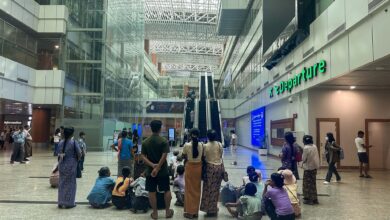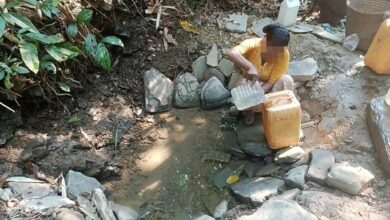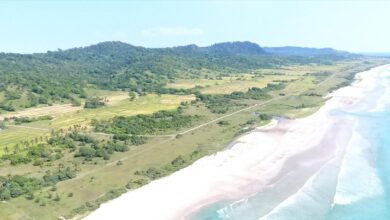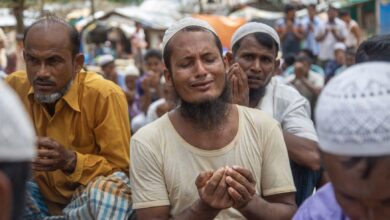
PYIN OO LWIN — About a hundred public servants were perched at their desks in an echoey lecture hall one afternoon in November, pens at the ready.
The students at the hall in Pyin Oo Lwin township were taking part in an eight-week course designed to train people taking on more senior government jobs.
Today’s lesson was on geopolitics. But some of the theories that Dr Tun Min shared about Myanmar’s place in the world were of questionable educational value.
Saudi Arabia, he declared, has offered to help Britain pay its multi-billion pound divorce bill when it leaves the European Union.
If the UK is taking money from a Muslim country, it’s little wonder that British media coverage of the Rohingya crisis has been so biased against Myanmar’s government, he mused.
“Is Saudi Arabia likely to be on our side or on ARSA’s?” he asked, referring to the Arakan Rohingya Salvation Army, whose deadly attacks on police posts in August 2017 were used to justify a massive military crackdown against the Rohingya.
When asked by Myanmar Now, Dr Tun Min was unable to offer any evidence for his claim that Saudi Arabia was helping to pay Britain’s Brexit divorce bill.
This branch of the Central Institute for Civil Service, a 900-acre complex of one-storey brick buildings built in 1999, is one of two facilities where those who make up the backbone of government services in Myanmar go to train.
Thousands of managerial staff who help administer policy – from immigration, health and taxation to energy, agriculture and construction – are trained at the institute every year.
The first facility, located in Hlegu, Yangon region, was founded by the generals in 1965 and was “a place where military propaganda was hammered into the employees,” said, U Kyee Myint, a former student.

Since Aung San Suu Kyi’s government came to power, the institute has undergone changes aimed at bringing it in line with a more democratic era.
There are no more military training drills, and students no longer have to all wear the same blue uniform; instead they attend class in their ordinary work clothes.
But, as with the country at large, the powerful influence of the military is still apparent at the centers.
The rectors are both retired military men, while some lectures draw on army propaganda and Buddhist nationalist rhetoric.
“The Tatmadaw is the mother, the Tatmadaw is the father!” Dr Tun Min declared to students in late 2017, according to Dr Soe Thura Zaw, a dental health officer at a public hospital in Mogok township and a former student at the institute. (In Myanmar, the term civil servant covers a broader range of government employees than in some other countries.)
At the end of class, Soe Thura Zaw said, students are instructed to clap exactly 20 times.
“One of our key objectives is to imbue the civil servants with a strict sense of obedience,” said U Nyi Nyi San, rector at the Pyin Oo Lwin facility and a retired lieutenant colonel.
“Top officials at government ministries often tell us that’s what they expect most from their staff,” he said.
But he added: “We don’t promote any propaganda.”
Despite the NLD’s landslide 2015 victory, the military has maintained significant influence over large numbers of government employees.
But the civilian administration signalled its intention to wrest some of this control back earlier this month by announcing plans to move the powerful General Administration Department out from under the military-controlled home affairs ministry.
The department’s 36,000 staff have significant reach, operating in every township in the country collecting taxes, maintaining law and order and settling disputes.
‘Traitor maggots’
Dr Tun Min concluded his class in November by showing a collage of photos. In one, an image of a Buddhist flag was accompanied by the phrase, “Myanmar Theravada Buddhism must last forever”.
Beneath it was a picture of a dead Myanmar policeman lying in a pool of blood and another of Russian President Vladimir Putin above a quote that has previously been falsely attributed to him: “Russia does not need the minorities, the minorities need Russia”.

During the 2017 class, Dr Soe Thura Zaw claims, the lecturer criticised the NLD by saying the peace process was failing because the party was “unwilling” to make it work.
The doctor said he debated the lecturer and suggested that if armed groups are unwilling to achieve peace, the government’s efforts are bound to fail.
“He ended the lecture by saying he could swear an oath with blood from his arm that the Tatmadaw wants peace,” Dr Soe Thura Zaw said.
The lecturer denies criticising the NLD, and says he only stated that Aung San Suu Kyi once urged ethnic armed groups not to rush into signing ceasefire agreements before her party could form a majority government.
He has also aired his views on the state counsellor and the military on his Facebook page.
In one post, he appeared to reference unfounded rumours that foreign armed forces were planning to invade Myanmar.
“The Commander-in-Chief of the Defence Services is preparing for foreign wars together with ethnic leaders,” he wrote in September last year. “Wait and see where the traitor maggots run.”
In another he shared a cartoon that portrayed Aung San Suu Kyi, with help from the US and the UN, pulling an image of Myanmar apart.
‘Like a Ma Ba Tha dhamma’
Late last year, Soe Thura Zaw decided to post on Facebook about his experience at the institute. He mentioned in the post, which went viral, that lecturers had told students not to marry people from different religions, and not to spend money at shops owned by people from other religions.
The political science lectures were like a “Ma Ba Tha dhamma talk,” he wrote, referring to the group led by nationalist monks that was officially declared unlawful in 2017.
After the post, he was accused of violating regulations for government staff and was questioned by superiors at the Ministry of Health in Mandalay.
In response, hundreds of former students from the course took part in a social media campaign by writing “We stand with Dr Soe Thura Zaw” on their Facebook timelines. Former students who studied at the institute with him posted messages saying that he was telling the truth about the course.

The ministry of health called a press conference last month to address the controversy. Minister Dr Myint Htwe told reporters Dr Soe Thura Zaw was a “hardworking and intelligent” person, and there is no plan to take further action against him.
‘No benefit’
Another former student recalled a lecturer using more subtle methods to express their dissatisfaction with the NLD leader.
Naing Htoo Aung, a medical doctor, said that during a political science lecture in 2015, the lecturer dimmed sections of patriotic words and phrases that matched up with parts of the NLD leader’s name – the implication being that she was not patriotic.
“When the words ‘Pyi Daung Suu Sait Dat’ [Union Spirit] were shown on the projector, the word ‘Suu’ was dimmer than other words,” the former student said.
“In another sentence that contained the words ‘Amyotha A Chin Chin Chit Kyi Yinne Yey’ [friendship among citizens], the word ‘Kyi’ had a lighter color. It was like that,” he said.
Dr Naing Htoo Aung found the course overall to be unhelpful.
“The good thing was I made a lot of friends, I got better at socializing. That’s the only good thing about the course – the rest offered no benefit at all,” he said.
“These courses are just a waste of government funding,” said Dr Soe Thura Zaw.

Rector U Nyi Nyi San said he found that doctors are usually the most difficult to discipline because there is a shortage of medical staff. So the civil service board must accept them even if they fail the course.
At the institute’s Hlegu branch in November, associate professor Yin Yin Nwe taught a political science class of about 100 that included police officers and judicial employees.
Holding a wireless microphone, she echoed points that appeared in school textbooks under military rule.
She explained that military leaders had little choice but to maintain power in Myanmar for decades after a 1962 coup, and stated that the 2008 constitution was passed with public support.
In fact the referendum to approve the charter was considered a sham by local and international rights groups.
She also suggested to students that foreign powers were using the media to “interfere” in Myanmar’s affairs and were disseminating fake news.
The lecturer told Myanmar Now she taught her classes based on directions from her superiors.
‘Brainwashing’
Rectors U Nyi Nyi San and U Aung Tin Soe, who heads the Hlegu facility, said the even though they are both former military men, the courses are taught according to the policy of the current government.
One of the biggest changes under the NLD, they said, is that military drills have been replaced with lessons on subjects such as management, economics, social sciences, law and English.
About 10,000 government staff a year receive training at the facilities, which each have a budget of three billion kyat, or roughly US$2 million.
The deputy information minister U Aung Hla Tun, who attended a course at the institute in 1983, said that while he made lots of friends and learnt useful things such as accounting, he also experienced “brainwashing” while there.
He said he supports further changes to modernise the courses at the institute.
“We don’t want to close them down. But the course curriculum needs to be changed a lot,” he said.
(Editing by Joshua Carroll)



